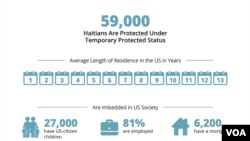Nearly eight years after Haiti’s devastating earthquake killed more than 200,000 people on the island, the Trump administration has decided to end its designated security program known as TPS, or Temporary Protected Status, which allowed nearly 60,000 Haitians to live and work in the United States.
In New York City, home to one of the largest established diaspora populations in the country, Haitians are beginning to prepare their next steps but welcome having some time to do so.
Across the country, as families began preparing for the holiday season, Haitian families with temporary protected status, or TPS, were met with a decision by the Trump administration to end the program permanently in July 2019. The decision was based on an assessment that conditions on the island ravaged by the 2010 earthquake had — quote — “significantly improved such that they no longer prevent nationals of Haiti from returning safely,” — end quote.
In response, advocates for extending the program took to the steps of New York’s immigration court in lower Manhattan. Ritha Pierre, president of the Haitian-American Lawyers Association of New York, said there are growing concerns among local recipients.
“They don't know if they need to actually start making plans to go to Haiti," Pierre said. "At this point people are really confused, and they don't know how to take the news. They are not necessarily celebrating, but they're also — they just don't know what to do.”
But Jocelyn McCalla, advocacy coordinator at Haitian-Americans United for Progress, considers the decision to allow the program to expire after 18 months a reason to be hopeful.
“The fact is that many people did not believe that the President Trump or his administration would in fact go beyond what was already decided about six months ago. It has gone beyond it, so I think that people are going to be able to take a breather, and they will enjoy and celebrate for the few days to come, and then get ready to take on the struggle," McCalla said.
According to Pierre, TPS recipients are mostly hesitant to come forward in public amid misinformation and fear. But among the larger community, some feel the decision — which comes right before the annual Thanksgiving holiday — will not ruin the occasion for their families.
“They’re not really letting the TPS status take away the holiday spirit. I think the celebration is still going on. People are still happy to live here," Haitian-American Lalanne Stanley told VOA.
But community activists say they don’t plan to sit back and “pray” for change in the coming months.
“We have to continue lobbying, continue fighting, continue urging Congress to create these pathways to citizenship," Pierre said. "But we also need to go into the communities, address the hysteria that is going to start happening if it hasn't already, and actually help create potential exit plans for these individuals.”







